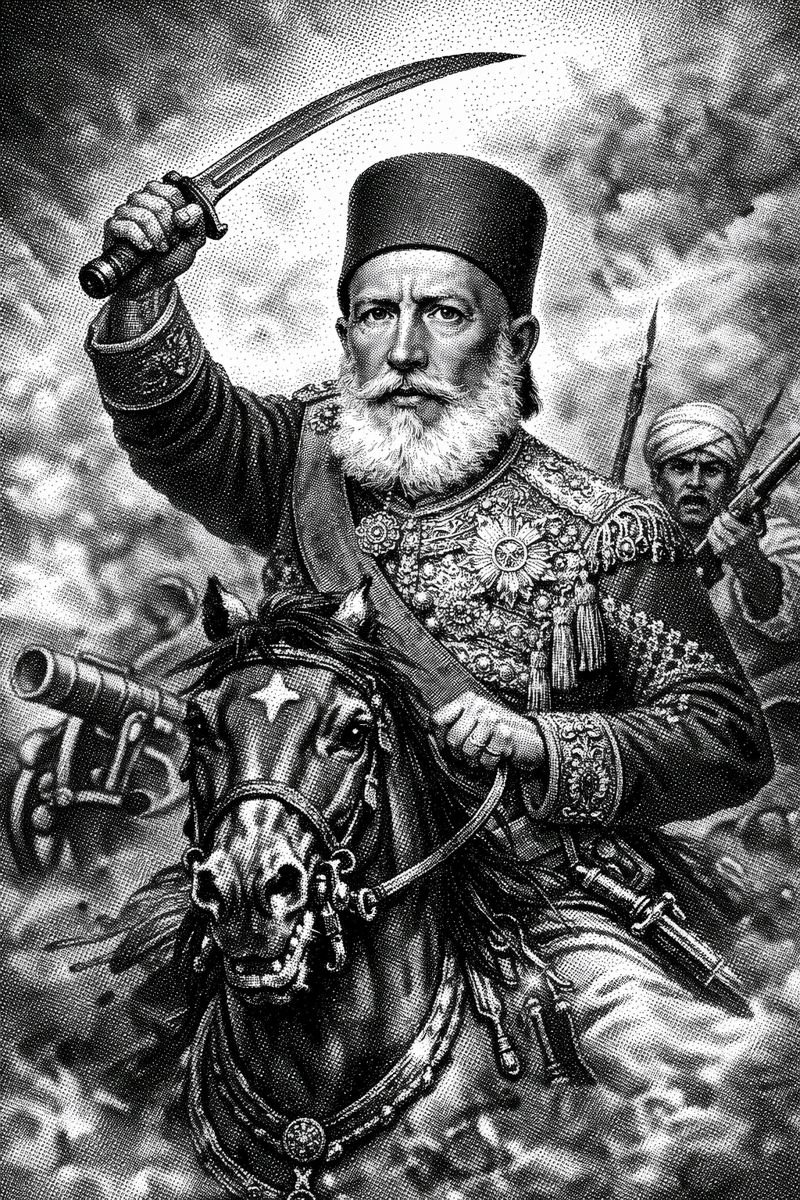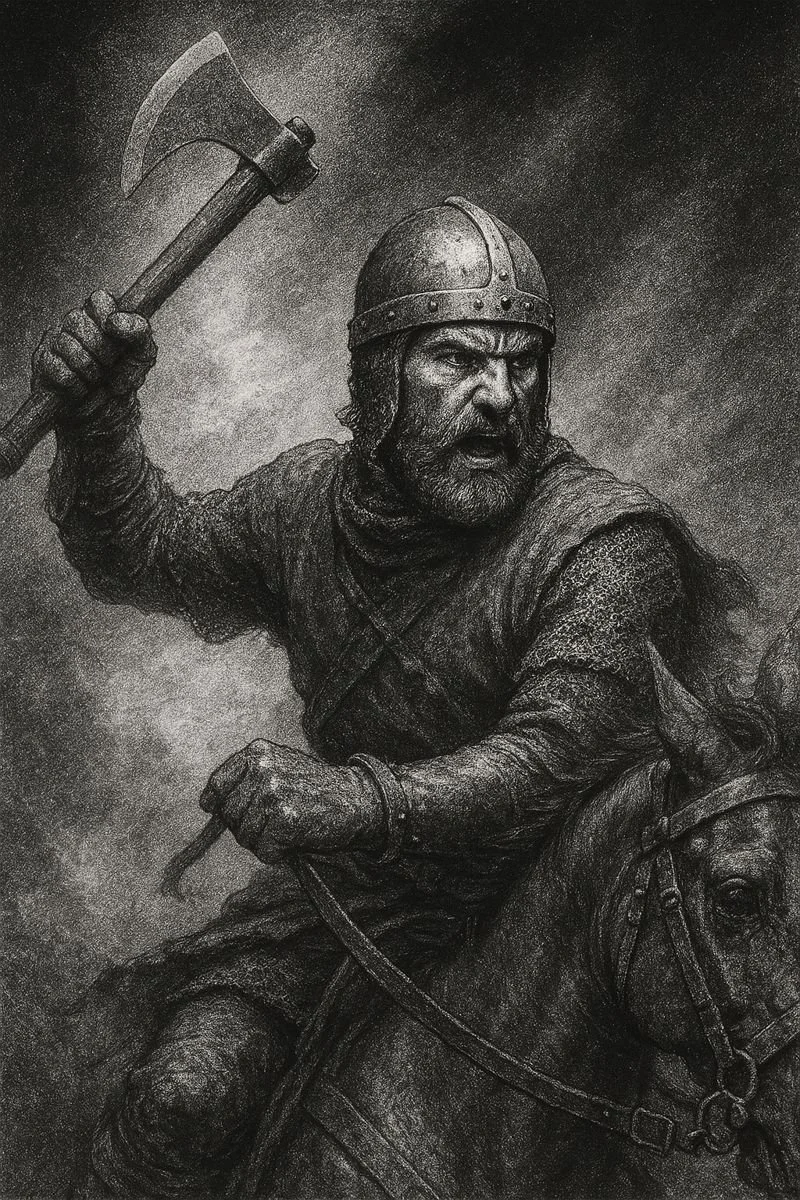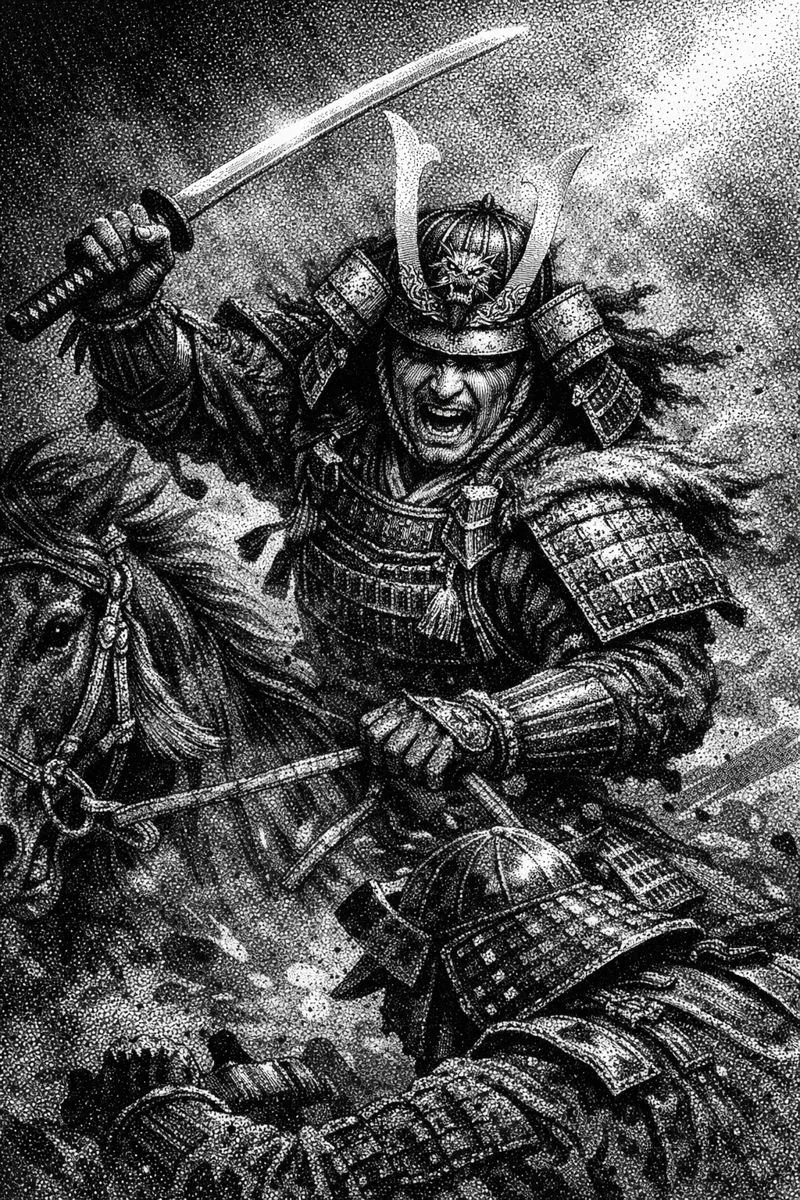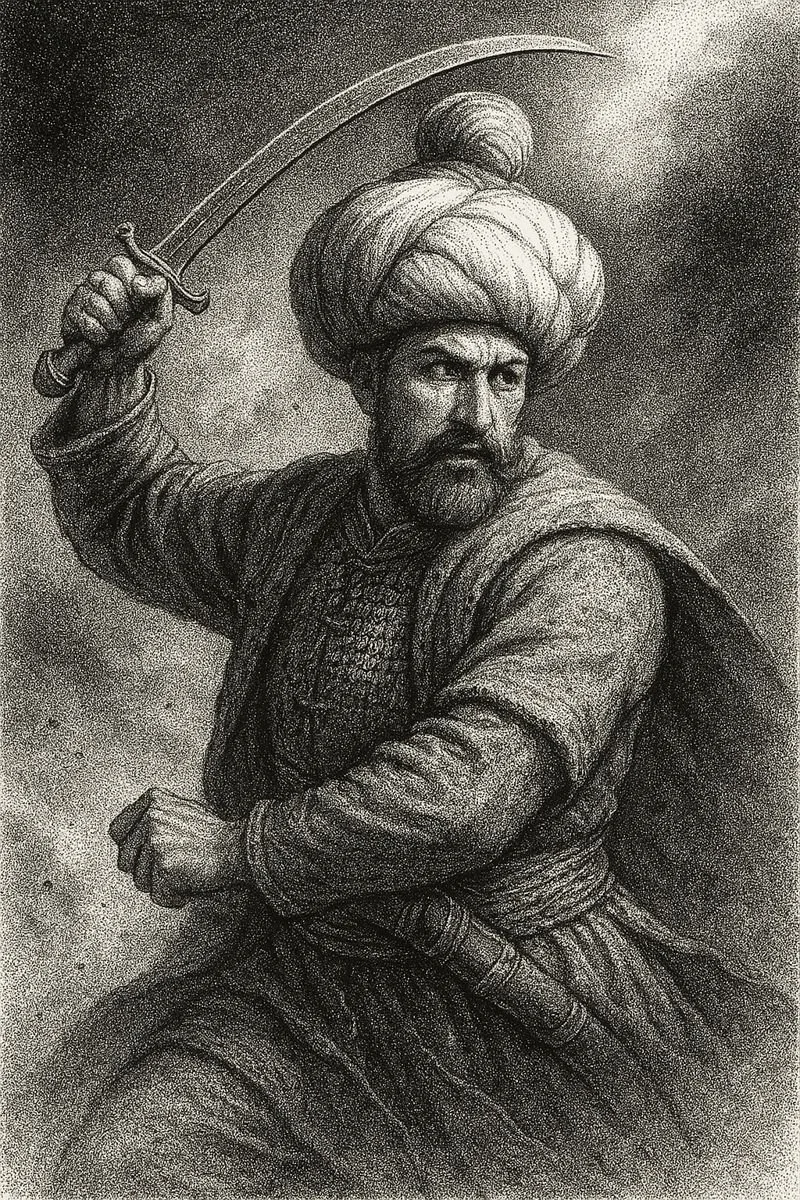Arminus
(c. 18 BCE – 21 CE)
He spoke Rome’s language just long enough to bury it in the mud.
“Rome called it a massacre. The Germans called it Tuesday.”
The rain came sideways, slicing through the Teutoburg Forest like God was sharpening his knives on the wind. Mud swallowed sandals. Shields slipped. Horses screamed in Latin. And somewhere in the green-black chaos, a Roman centurion realized—too late—that his beloved empire had just marched headfirst into the world’s worst camping trip.
Welcome to 9 CE, deep in Germania—where the trees are thick, the sky never smiles, and your friendly local guide is named Arminius. He’s charming, fluent in Latin, and happens to be the architect of the most humiliating defeat in Roman history. You know, that one where three whole legions vanished into the woods and reappeared only as fertilizer.
The Setup: How to Lose an Empire in Ten Miles or Less
Let’s start at the beginning—because every good ambush deserves context. Arminius wasn’t born a wild-eyed barbarian screaming about freedom. He was trained to scream about it properly, in Latin. A Cherusci noble, raised under Rome’s smothering wing, he did the whole polite imperial exchange program: hostage schooling, Roman military education, citizenship, a shiny equestrian rank. He served in the Roman army, fought for Augustus, learned discipline, tactics, and how to stab efficiently instead of passionately.
Rome thought they were civilizing him. What they were really doing was giving the wolf a map to the sheep pen.
Arminius returned to Germania fluent, polished, and smiling just wide enough to hide the knife. He played the loyal ally to Publius Quinctilius Varus, Rome’s governor in the region—a pompous bureaucrat whose greatest military accomplishment was losing arguments with Augustus. Varus strutted around Germania like it was a poorly lit suburb of Rome. Taxes were imposed. Local kings were snubbed. Crucifixions popped up like new taverns. The tribes hated him, but Arminius? He was the translator, the friend, the native who assured Varus everything was under control.
Spoiler: everything was not under control.
The Trap: Mud, Blood, and Bureaucratic Overconfidence
Early September, 9 CE. The tribes start whispering about rebellion. Varus decides to show them what discipline looks like—by marching three full legions, auxiliaries, and civilians straight into the forest. No scouting parties. No cavalry screen. Just a slow-moving parade of bureaucracy, arrogance, and doomed paperwork.
Arminius, ever helpful, volunteers to “go gather more intelligence.” Translation: fetch the kindling.
When the storm rolled in, it wasn’t just weather—it was narrative justice. The Roman column stretched for miles, armor clattering, carts creaking, the whole imperial machine slogging through knee-deep muck while javelins whistled from the trees. The Germans didn’t charge—they evaporated and reappeared. Spears flew from nowhere. Every tree looked like a murderer.
Varus tried to form ranks, but there were no ranks to form—just screaming men slipping in filth while invisible enemies laughed in their native tongue. Arminius, that smiling student of empire, had called in a dozen tribes who hated each other yesterday and loved killing Romans today. They encircled the legions, cutting them down in slow-motion hell over three days and nights.
By the time it ended, some 15,000–20,000 Romans were dead. Others were captured and nailed to trees. Varus fell on his sword, because even suicide was more dignified than explaining this to Augustus. The survivors staggered out of the woods muttering prayers to gods who clearly hadn’t been listening.
Rome didn’t just lose soldiers in Teutoburg. It lost the fantasy of infinite empire.
Aftermath: “Varus, Give Me Back My Legions!”
When word reached Augustus, the old man reportedly smashed his head against a wall shouting, “Quinctili Vare, legiones redde!”—“Varus, give me back my legions!” Which is Latin for “We just got our imperial ass kicked by guys wearing bark armor.”
For Rome, the defeat was an existential hangover. No more dreams of conquering Germania; they pulled back behind the Rhine like a kid realizing the ocean is, in fact, deeper than the kiddie pool. Fortresses were reinforced. Legions renumbered. Maps redrawn to politely omit the forest where ambition went to die.
Arminius, meanwhile, was hailed as the savior of Germania—the man who’d stopped the world’s most powerful army with mud, trees, and spite. He tried to turn that victory into a united German confederation, but here’s the problem with uniting Germans: they all think they’re in charge. Within a few years, tribal infighting returned with a vengeance. Arminius found himself less a hero and more a political liability.
His enemies accused him of tyranny. His own kin plotted against him. Eventually, his own relatives murdered him around 21 CE—proof that while Rome might conquer with roads and steel, the Germans preferred their politics short, sharp, and fratricidal.
No statues, no coins, no triumph. Just a body in the dirt and a forest that remembered.
The Myth: From Tribal Hero to National Ghost
For a millennium, Arminius faded into the moss. The Romans called him Arminius; his people called him Hermann. Same guy, different brand. Centuries later, when Germany needed a myth—something noble, ancient, and anti-Roman—Arminius was resurrected like a pagan Christ with better hair.
The Renaissance made him a symbol of liberty. The 19th century turned him into a nationalist mascot. By the time of Bismarck and the Kaiser, he’d been remolded into Hermann the Liberator, sword aloft atop the Hermannsdenkmal monument in the Teutoburg Forest—a 173-foot bronze flex that basically said, “Try it again, Rome.”
Nazi Germany, of course, took the myth and did what Nazis always do: weaponized it, sterilized it, and made it boring. “Hermann the German” became an Aryan fantasy, stripped of irony and loaded with propaganda. After 1945, nobody wanted to say his name too loudly. It took modern historians to rehabilitate him—not as a proto-Nazi freedom fighter, but as a cunning opportunist who played empire like a fiddle and then got stabbed for his trouble.
The Legacy: Freedom, Mud, and the Ghost of a Grudge
Arminius didn’t just win a battle. He redrew the psychological map of Europe. The Rhine became Rome’s limit—and, by extension, Western civilization’s unofficial “Do Not Disturb” sign. The dream of a unified Germania flickered out, but the idea of defiance survived. Every rebel, reformer, and freedom zealot since has found some part of themselves in that soaked, grinning traitor who turned Roman discipline into fertilizer.
The Teutoburg Forest stands as the birthplace of the European neurosis: too independent to be conquered, too divided to rule itself. Arminius is both hero and warning—proof that victory without unity is just another prelude to tragedy.
As for the Romans, they never fully got over it. A century later, Germanicus led a punitive campaign to avenge the lost legions. They found the old battlefield strewn with bones, skulls nailed to trees, rusted swords, and altars to vengeance. They buried what they could, wept for what they couldn’t, and went home. Germania was still unconquered.
And somewhere, deep in the fog, the forest whispered back in Latin: never again.
Epilogue
Arminius—the Roman who destroyed Rome’s illusion, the barbarian who learned civilization’s language just to curse it properly—died betrayed by his own blood. The empire endured for centuries more, but never again tried to civilize the forest.
It’s said that when the last of his killers were themselves cut down, the ravens circled overhead and croaked his name. Maybe they were just fighting over scraps. Or maybe, in that green cathedral of ghosts, freedom was still laughing.
He taught Rome that even a wolf can wear a toga—right up until the day it bites the hand that dressed it.
Warrior Rank #142
Sources:
Tacitus. The Annals: Books I–II. Translated by J. C. Yardley. Oxford: Oxford University Press, 2008.
Cassius Dio. Roman History. Translated by Earnest Cary. 9 vols. Loeb Classical Library. Cambridge, MA: Harvard University Press, 1914–1927.
Wells, Peter S. The Battle That Stopped Rome: Emperor Augustus, Arminius, and the Slaughter of the Legions in the Teutoburg Forest. New York: W. W. Norton & Company, 2003.
The Hermannsdenkmal tourist pamphlet, which insists it was all about “cultural pride” and not a vendetta
“Varus, Give Me Back My Legions” — working title for every Roman historian’s therapy session
















Charles XII of Sweden was a warrior-king who personally led his armies through the Great Northern War, turning early victories into legend through ferocious discipline and reckless courage. His refusal to compromise or retreat ultimately shattered Sweden’s empire, leaving behind a mythic figure admired for bravery and criticized for destroying everything he fought to protect.
Rank - 125